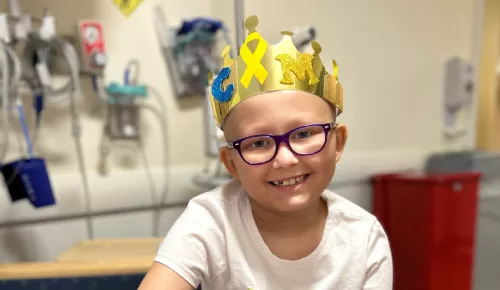
Nothing disrupts a family's life more than a cancer diagnosis—especially when the patient is a child. Stephanie is a mother of three who thought life was finally getting back to normal after keeping her family at home during the pandemic. But just as her kids were returning to in-person learning in the fall of 2022, her 7-year-old daughter, Grace, started coming home from class completely sapped of strength and energy.
"She was really tired, to the point where it seemed weird for a child her age," says Stephanie. "I thought she might have mono or Lyme disease. I took her to the pediatrician and asked for some lab tests." The results of the tests showed that Grace's red blood cell and hemoglobin count were critically low. She was rushed to Tufts Medical Center, where doctors diagnosed Grace with acute lymphoblastic leukemia. The family's world was upended. Suddenly, Stephanie had to drive her daughter into Boston from Topsfield up to 90 minutes each way with traffic, five days a week for treatment that would take up to four hours. She had to secure childcare for her two sons, whom she started homeschooling to safeguard Grace and her compromised immune system. She also had the agony of watching as her daughter suffered on the long car trips, often getting carsick and then being isolated in a tiny cubicle as she got her blood drawn, received chemotherapy treatment and waited for her test results.
That's when Grace's Tufts Medical Center team told Stephanie about pediatric in-home cancer care offered by Tufts Medicine Care at Home, and when she met Colleen Hoar, RN a nurse who would bring care and treatment to Grace. "We love Colleen. We love all the other nurses too," says Stephanie. "They are the best. I cannot say enough about them coming into our home; it makes the experience so much easier. It's truly amazing.
In her 15 years as a home health nurse, Hoar has seen many advances—and a pandemic—drastically increase the capabilities of and need for in-home oncology care. Not so long ago, a patient had to come into the hospital to have their ports accessed and blood taken. Now, trained nurses, like Hoar, can quickly and safely administer chemotherapy treatment, IV-based immunotherapy and hydration therapy in the comfort of the patient's own home. They can also draw blood and report back with the results within a couple of hours. But more than just the technological advancements of modern medicine, Hoar has been struck by the incredible impact in-home care can have on a family. "It's not as much of a disruption of their lives," says Hoar. "Dad can be on a conference call, peeking around the computer monitor, mom can be reading to the patient's sibling in the living room; all while the patient and I are doing our thing in the kitchen
In-home patients also miss less school and family life. But it's not just about convenience. There are also physical and mental health benefits for the patient who doesn't have to spend hours in the clinic or hospital setting. First off, the immunocompromised child isn't exposed to the diseases and infections that can dwell in a building full of sick people. In-home treatment also spares young patients a lot of stress. "When they go to the hospital, only one parent can accompany them," says Hoar. "And while they are at the hospital, they are isolated, waiting for the test results or treatment to finish. And often, they are sick and can feel miserable in a strange place. But this way, they can be sat on their home couch watching cartoons. We come in, do our lab draw and they go right back under the covers in the comfort of their own home."
Perhaps the most amazing benefit Hoar has experienced as an in-home nurse is how familiar and comfortable the entire family has become around her—and she around them. "We're in and out of the house for one to two years with leukemia kids," she says. "It's the same three or four nurses. We get to know the family, the dog and all." Hoar definitely knows Grace's dog Cooper. She also knows the easiest and most comfortable way to access Grace's veins for IV and blood draws. And afterwards, Hoar knows Grace prefers the bandages with emojis on them—she especially giggles at ones featuring the smiling poop emoji. Grace refers to days when Hoar comes to visit as "Colleen Days." "We love Colleen Day," says Stephanie. "We love all the nurses. Grace can be playing outside, crafting, singing, hanging out and watching movies or if she's not feeling well, lounging around in her pajamas. Colleen pops in, does the labs and pops right back out. She's part of the family."